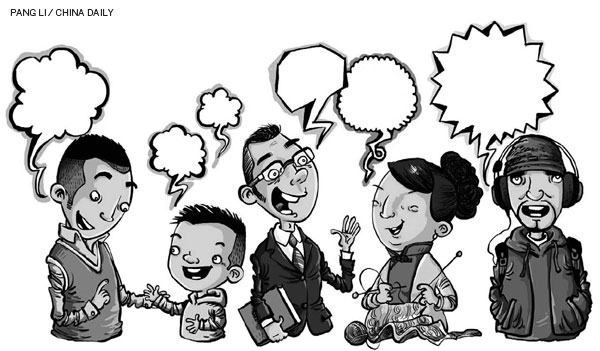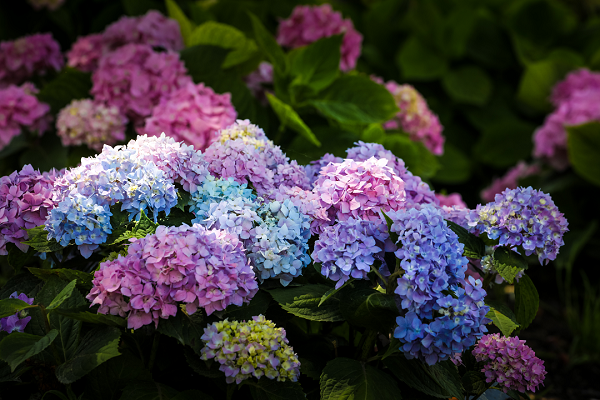Dialects have their limitations, but they also have their place in our culture. While social mobility is working against them, it seems rash to relentlessly push them over the cliff of usefulness.
A recent proclamation from the regulating agency for the television industry has made it clear that hosts for TV shows must not use dialects, but Mandarin (Putonghua) only.
This surprised me a bit because, living in Beijing, I have not heard any programs in dialects. When I was growing up in Zhejiang province, I could tune in to radio programs in the Shanghai dialect; and while I was a graduate student in Guangzhou, a few TV shows were in Cantonese. As far as I know, dialect programs have always been in a small minority.

I used to hold a very negative opinion on dialects. There are scholarly studies on the number of dialects in China, but that really depends on how you define a dialect. Where I grew up, you could cycle for half an hour and the popular pronouns would begin to change. People could tell where you were from simply by the way you said "I" and "you" and "he". And that was not fun. It means a cluster of villages have their own variation of a dialect. Naturally, the farther you travel, the more difference you'll encounter in terms of the speaking tongue, until you reach a place where it is virtually incomprehensible.
I can imagine northern people who first arrive in Shanghai and their frustration in, say, asking directions. When I first heard Cantonese mention "afternoon", I thought they were referring to "next week". Generally speaking, the closer a dialect is to Mandarin, the easier it is to grasp it. So, the most difficult dialects are all in southern parts of the country as Mandarin is based on the Beijing dialect. But that's not taking into account ethnic minorities, many of whom have their own distinct languages.
It would be a chaotic and somewhat ludicrous scene to have a roomful of people talking in his or her own dialect and guessing what others are trying to get across. In the old revolutionary movies, all leaders would speak their own dialect, but they seemed to get along fine, without missing a single word muttered by others. Dialect, as I saw it then, was a big barrier to mutual understanding. It segments the country into thousands, if not millions, of small pieces where one's identity is pigeonholed and confined.
At that time, every child in China had to learn two languages, or more accurately, two spoken versions of the same language, one vernacular and the other Mandarin. Some were required to speak Mandarin in school and would revert to the local tongue once outside. So people learned to toggle between the two. One would inadvertently show one's level of education by how much the dialect was detectable in the Mandarin spoken. Being able to speak only dialect usually meant you were not properly educated.
Of course, in an age of little mobility, that did not pose any problem as everyone else spoke the same dialect. In fact it would be strange if you blurted out in Mandarin to your family members or neighbors, or even your teachers once out of school.
As I travel the country and read up more on literature from a wide reach of locations, I have learned to appreciate the beauty of dialects. While a hindrance in peripatetic communication, dialects can add a touch of local color to arts and literature if used appropriately. Each dialect has many expressions that have no equivalents in Mandarin. They are all part of our linguistic assets. But we tend to take them for granted because we either use them in our daily lives or are unaware of those we are unfamiliar with.
Eileen Chang's stories are suffused with sayings typical of the Shanghai area. She once talked about an interjection nao that Shanghainese use in situations similar to "well" as an alert to something. And like "well" in English, it does not have an exact equivalent in Mandarin. Small details like that help create a literary world full of nuances and color. And can you change Lao She's play Teahouse from Beijing dialect to standard Mandarin? I'm sure you can preserve the meaning of every sentence, but it would be devoid of the verbal sizzle that makes it great.
In recent decades, comedian Zhao Benshan stands out for popularizing the northeastern dialect. Words like huyou, which means hoodwink, were hardly heard of in southern China before he pushed it into the national vocabulary via his widely watched television skits.
I don't know where the tipping point was when dialects turned from a communication obstacle to a cherished heritage for Chinese culture. But when I stumbled upon children in my hometown talking to each other in Mandarin while playing on the street, it dawned on me that the days for most dialects are doomed. They would disappear within one generation or two. Possibly within my lifetime, most dialects would go down the road of calligraphy, or worse the abacus, where they would be under academic scrutiny and government protection, but out of the daily use of the common folk.
Efforts to suppress dialects at the current stage of economic development seem well-intentioned but ill-advised. In an era of ubiquitous mass communication and high mobility, sheer necessity determines the importance of Mandarin. Even ethnic minorities who were drilled home bilingual proficiency have to rely on Mandarin to seek work outside their hometowns.
The ability to speak Mandarin should be taught to every child in China. But it does not have to come at the expense of dialects. Children can perfectly handle both Mandarin and a dialect. They are losing interest in the dialect because it is perceived as uncool, partly because it is not the patois of their favorite entertainment. Not everyone has the talent or the platform to create dialect-based shows that click with a nationwide audience as Zhao Benshan has been doing so effectively. But it is time people started to see dialects as an asset, rather than a liability, that can enrich their verbal expressiveness.
With or without government intervention, most dialects will vanish. But there is no sense in hastening their demise. There is a need for dialect programming on local radio and television stations. It is the proportion that should be calibrated. Too much of it may turn off new arrivals who try to fit in. I have noticed a new trend of mixing dialects with Mandarin for some forms of entertainment, which, if you think of it, is an accurate reflection of the current state of linguistic convergence.
Dialects should never be used to discriminate against outsiders who do not know them. All dialects in China, and ethnic languages, are an integral part of our civilization. They may give us local identities and make us proud of the places where we grow up. As long as inter-dialect communication is kept smooth, meaning nobody outside a dialect group is made to feel alienated, there is nothing wrong with sprinkling one's conversation with a sampling of dialect. Sometimes it can be the little act of nonconformity that distinguishes one from the pack. And who knows, some of those dialectal idioms may find their way into the repository of Mandarin and be shared by all in the nation.
Contact the writer at raymondzhou@chinadaily.com.cn.
(China Daily USA 01/31/2014 page4)


